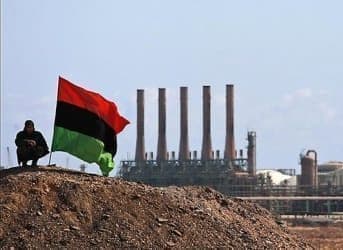A day after Libya announced it would seek to increase its OPEC oil output quota once production reaches 1.7 billion barrels per day, an attack on the French Embassy recalled the dismal security reality in the country.
On Tuesday, a car bomb exploded outside the French Embassy in Tripoli, in the upscale neighborhood of al-Andalus, wounding three and setting the building on fire. The explosion took place in the early morning hours before staff arrived at the facility.
This is the second major attack on a Western diplomatic facility since September 2012, when the US ambassador and three others were killed in Benghazi.
This time, though, the attack was in Tripoli, where most diplomats have relocated since the attack on the US diplomatic mission in Benghazi. This was the first such attack in the Libyan capital.
Related article: Libya's Security Should Mirror Oil Ambitions
No specific group has claimed responsibility for the French Embassy attack, but take your pick of roving militias and fighters fresh from the theatre in Mali, where the French are holding out since their military intervention there earlier this year to root out al-Qaeda-linked forces in Mali’s north.
Certainly the French make the Mali connection, with President Francois Hollande calling the bombing an assault on all countries engaged in the fight against terrorism.
Al-Qaeda in the Islamic Maghreb (AQIM) has threatened to seek revenge against all countries taking part in the war in Mali. The group has called on "all Muslims to target France and its interests and subjects inside and outside France until it withdraws the last soldier from the land of the Muslims and lifts its support of rulers of the region." And of course, moving with the times, this is all done via Twitter.
Libya has always been the easiest theatre for blowback from Mali, and since the start of the French intervention there, fighters have been shifting back and forth across the borders of the Sahel. Indeed, intelligence indicates that the January attack on the BP-operated Amenas gas facility in Algeria was launched by fighters who came across the border from Libya.
There has been a clear increase in violence over the past months in Libya, related both to events in Mali and to an internal struggle for power. While Mali blowback tends to focus on Western diplomats, the internal power struggle will necessarily focus more clearly on the country’s oil resources. In March there were a number of attacks on various oil fields and gas facilities in Libya, including the key Dahra and Ghani oil fields. The intermingling of worker strikes, internal power struggles and Mali blowback continues to derail production efforts.
Libya has some 40 billion barrels of proven reserves of sweet crude oil—Africa’s largest such reserves. Before the 2011 revolution it was producing around 1.6 million barrels per day. Today it’s producing around 1.5 million barrels of oil equivalent per day, which is still impressive given the security situation. The country has plans now to ramp up production to 1.7 million barrels of oil equivalent per day by the end of this year.
Once it reaches that target, which looks increasingly challenging as the security situation further deteriorates, Libya will seek to increase its OPEC output quota, which will be addressed at the body’s next meeting on 31 May.
Related article: Will Syrian Oil Developments Mirror Libya's?
However, since 2011, OPEC countries have abandoned individual quotas for an overall 30-million-bpd output. OPEC may reconsider this at its next meeting. There is talk of cutting output, and Libya, which is targeting its own rise in output, is hoping to ensure that it gets a higher quota to support this.
Not only is Libya seeking increased production to above pre-revolution levels, it’s also planning to open up bidding for some new exploration blocks by the end of this year and has hinted that it may review its exploration and production-sharing agreements to make them more favorable to investors.
With security as it is, and only getting worse, luring in more investors might require a sweetening of the package, but then again it might not. While some companies have pulled out of Libya--like France’s Ponticelli pipeline company and Shell, which abandoned two exploration blocks in Libya in May last year--others are flocking back, willing to brave the risks for the reward.
Russia’s Tafneft is back to develop an oil block it started in 2005, and Italy’s Eni, which as the biggest stake in Libya, returned in December 2012 and has re-launched exploration.
What about BP, the owner of the Amenas gas facility in Algeria of hostage-incident fame? Before that attack, BP was talking about returning to Libya this year. So far that hasn’t happened, but there are rumors it may resume onshore exploration before the end of 2013.
In April, Libyan officials definitively said they would not allow foreign security forces to guard oil zones.
By. Charles Kennedy of Oilprice.com


















